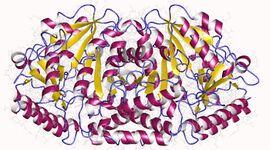Biology:Kynurenine—oxoglutarate transaminase
| kynurenine-oxoglutarate transaminase | |||||||||
|---|---|---|---|---|---|---|---|---|---|
 Kynurenine aminotransferase-I homodimer, Human | |||||||||
| Identifiers | |||||||||
| EC number | 2.6.1.7 | ||||||||
| CAS number | 9030-38-0 | ||||||||
| Databases | |||||||||
| IntEnz | IntEnz view | ||||||||
| BRENDA | BRENDA entry | ||||||||
| ExPASy | NiceZyme view | ||||||||
| KEGG | KEGG entry | ||||||||
| MetaCyc | metabolic pathway | ||||||||
| PRIAM | profile | ||||||||
| PDB structures | RCSB PDB PDBe PDBsum | ||||||||
| Gene Ontology | AmiGO / QuickGO | ||||||||
| |||||||||
In enzymology, a kynurenine-oxoglutarate transaminase (EC 2.6.1.7) is an enzyme that catalyzes the chemical reaction
- L-kynurenine + 2-oxoglutarate ⇌ 4-(2-aminophenyl)-2,4-dioxobutanoate + L-glutamate
Thus, the two substrates of this enzyme are L-kynurenine and 2-oxoglutarate, whereas its two products are 4-(2-aminophenyl)-2,4-dioxobutanoate and L-glutamate. The former product is an unstable α-oxo acid that quickly undergoes intramolecular cyclization to form kynurenic acid.[1]
This enzyme belongs to the family of transferases, to be specific, the transaminases, that transfer nitrogenous groups. The systematic name of this enzyme class is L-kynurenine:2-oxoglutarate aminotransferase. Other names in common use include kynurenine transaminase (cyclizing), kynurenine 2-oxoglutarate transaminase, kynurenine aminotransferase, and L-kynurenine aminotransferase. This enzyme participates in tryptophan metabolism. It employs one cofactor, pyridoxal phosphate.
KYAT1, AADAT (aka KYAT2), and KYAT3 are examples of enzymes of this class. GOT2 (aka KYAT4) is also believed to catalyze the above reaction.[2]
Structural studies
As of early 2009, 18 structures have been solved for this class of enzymes, with PDB accession codes 1X0M, 1YIY, 1YIZ, 1W7L, 1W7M, 1W7N, 3E2F, 3E2Y, 3E2Z, 2ZJG, 2YGZ, 2Z61, 2R5C, 2R2N, 2R5E, 3B46, 3DC1, and 2QLN.
References
- ↑ "Substrate specificity and structure of human aminoadipate aminotransferase/kynurenine aminotransferase II". Bioscience Reports 28 (4): 205–15. August 2008. doi:10.1042/BSR20080085. PMID 18620547.
- ↑ "Mitochondrial aspartate aminotransferase: a third kynurenate-producing enzyme in the mammalian brain". Journal of Neurochemistry 102 (1): 103–11. July 2007. doi:10.1111/j.1471-4159.2007.04556.x. PMID 17442055.
Further reading
- "Kynurenine transaminase from neurospora". The Journal of Biological Chemistry 221 (2): 689–95. August 1956. PMID 13357462.
- "Kynurenine transaminase of rat kidney; a study of coenzyme dissociation". The Journal of Biological Chemistry 227 (1): 61–8. July 1957. PMID 13449053.
- "Crystal structure of human kynurenine aminotransferase I". The Journal of Biological Chemistry 279 (48): 50214–20. November 2004. doi:10.1074/jbc.M409291200. PMID 15364907.
- "Crystal structure of a human kynurenine aminotransferase II homologue from Pyrococcus horikoshii OT3 at 2.20 A resolution". Proteins 61 (3): 685–8. November 2005. doi:10.1002/prot.20614. PMID 16138312.
- "Crystal structures of Aedes aegypti kynurenine aminotransferase". The FEBS Journal 272 (9): 2198–206. May 2005. doi:10.1111/j.1742-4658.2005.04643.x. PMID 15853804.
- "Biochemical and structural properties of mouse kynurenine aminotransferase III". Molecular and Cellular Biology 29 (3): 784–93. February 2009. doi:10.1128/MCB.01272-08. PMID 19029248.
- "Crystal structure of human kynurenine aminotransferase II". The Journal of Biological Chemistry 283 (6): 3567–73. February 2008. doi:10.1074/jbc.M708358200. PMID 18056995.
- "Crystal structure of human kynurenine aminotransferase II, a drug target for the treatment of schizophrenia". The Journal of Biological Chemistry 283 (6): 3559–66. February 2008. doi:10.1074/jbc.M707925200. PMID 18056996.
- "Substrate specificity and structure of human aminoadipate aminotransferase/kynurenine aminotransferase II". Bioscience Reports 28 (4): 205–15. August 2008. doi:10.1042/BSR20080085. PMID 18620547.
- "Structural insight into the mechanism of substrate specificity of aedes kynurenine aminotransferase". Biochemistry 47 (6): 1622–30. February 2008. doi:10.1021/bi701800j. PMID 18186649.
- "Identification of formyl kynurenine formamidase and kynurenine aminotransferase from Saccharomyces cerevisiae using crystallographic, bioinformatic and biochemical evidence". Biochemistry 47 (6): 1608–21. February 2008. doi:10.1021/bi701172v. PMID 18205391.
 |

